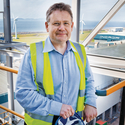Iggesund invests in green future at UK board mill
31 July 2012
Iggesund Paperboard, part of the Swedish Holmen Group, is investing £108 million in a new biomass energy system at its mill in Workington, Cumbria, northwest England. The new boiler is expected to enable the company to become completely self-reliant for its energy needs, eliminate the use of fossil fuels completely and reduce CO² emissions to almost zero.
The boiler will come on line in March 2013, subject to obtaining its Green Certificate from the EU, and will replace the mill’s existing gas fired unit. The biomass system will run entirely on renewable energy sources, much of it to be sourced locally, and will require 500,000 tonnes of biofuel annually.
“In our investment in the new biofuel boiler, profitability and reduced climate impact go hand in hand,” says Ola Schultz-Eklund, the mill’s managing director. “We know that the cost of fossil-based energy will increase faster than that of biofuel, so we see this investment as a way to stabilise our energy costs.
“At the same time, our emissions of fossil carbon dioxide from the production process will fall to almost zero, which should make us an even more interesting option for the large end-users, who have more or less promised consumers that they will both declare and reduce the emissions created by the products they sell.”
A particular issue for the new energy system is the sourcing of biofuel, and the company has been very careful to involve the local community in this aspect of the project. While Workington is on the UK’s ‘Energy Coast’, close to a major nuclear facility, it is in a very rural area with many local farms. Iggesund has approached them with proposals to cultivate energy crops in the form of willow to provide a substantial amount of fuel for the boiler.
Grow Your Income contract
“We’ve developed a package of measures that includes technical advice, financial support for the transition and a harvesting and transport service, all based on long term contracts,” explains Ulf Lofgren, financial director and a member of the team that developed the offer, being launched under the name of ‘Grow Your Income’.
The company will offer 20-year contracts with index linked pricing over the period. A 10 hectare area close to the mill, owned by Iggesund, is set to be planted very shortly.
First crops should be available in three years and, until then, alternative sources of renewable fuels have been identified. The company has set a target of 2,500 hectares for growing willow.
The UK’s environment department, Defra, has identified large parts of Cumbria as being highly suitable for the cultivation of energy crops. The new market for these should be considerably larger than just Iggesund’s requirements, it believes, as energy costs of fossil-based fuels increase in future.
Looking to the future, Ian Black, head of customer services and development at the mill, comments: “The reduction in emissions will immediately be equivalent to those produced by the nearby city of Carlisle with a population of 100,000. But we see the possibilities of generating enough energy eventually to supply power to the grid for community or district heating.”
Recently, a £2 million palletising system has been installed at the mill to improve the handling and wrapping of sheets and rolls of board prior to transportation.
In June, Iggesund completed the installation and commissioning of a €240 million recovery boiler and turbine at its plant in Sweden. The turbine should be able to supply 520GWh/year and in the longer term make the mill completely self-sufficient in electricity. When exactly the latter will occur depends very much on how quickly the pulp production develops. The mill has a permit to produce 255,000 tonnes of pulp annually, but has applied for permission to increase yearly production to 420,000 tonnes.
Workington is responsible for the company’s entire output of Incada folding box board, which is used extensively in packaging for food, cosmetics, confectionery, pharmaceutical and tobacco products. Capacity at the mill is around 200,000 tonnes/annum.
Iggesund took over the site from Unilever, then owner of Thames Board Mills, in 1987 and has expanded and modernised the plant continuously since then, today employing almost 400 people on the site.
Ola Schultz-Eklund Ola Schultz-Eklund New biomass energy system at Iggesund's mill in Workington Iggesund



